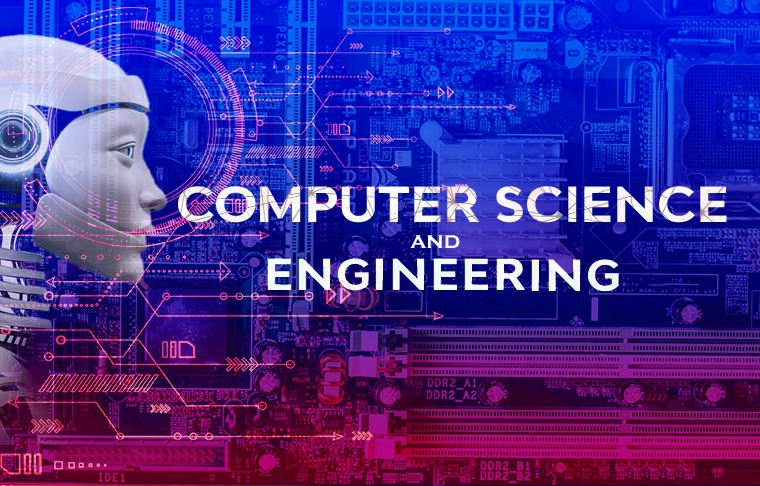
About Department
The Department of Computer Science and Engineering was established in the year 2010 with key motif of success to the students in achieving their goal. The Department has well-equipped Laboratories and Research Laboratories with licensed software’s and also the faculties motivate and encourage their students in upgrading their skills through, motivating students to take active participation in Hackathons, Industrial Visits and In-plant training Programmes. The Department follows enhanced teaching aids like OHP, LCD , Smart Board projectors and e-Learning which help the students to visualize the concepts clearly in an easily and understandable manner.
Courses Offered
B.E. – Computer Science and Engineering - 4 Years
M.E. - Computer Science and Engineering - 2 Years
Ph.D. Information and Communication Engineering (CSE) –Part-Time/Full Time
VISION OF DEPARTMENT:
To be a center of eminence in creating competent software professionals with research and innovative skills.
MISSION OF DEPARTMENT:
We will strive
M1: Industry Specific: To nurture students in working with various hardware and software platforms
inclined with the best practices of industry.
M2: Research: To prepare students for research oriented activities.
M3: Society: To empower students with the required skills to solve complex technological problems of
society.
PROGRAM EDUCATIONAL OBJECTIVES:
1. PEO1: Domain Knowledge:
To produce graduates who have strong foundation of knowledge and skills in the field of Computer
Science and Engineering.
2. PEO2: Employability Skills and Research:
To produce graduates who are employable in industries/public sector/research organizations or
work as an entrepreneur.
3. PEO3: Ethics and Values:
To develop leadership skills and ethically collaborate with society to tackle real-world challenges.
PLI-BLOCKATHON:
Out of 300+projects across the globe, 3 projects from our college were selected as top 25 for the “WORLD BLOCKCHAIN HACKATHON-INDIA’22” held by PLUGIN Dubai and HUMCEN (at Sathyabhama University, Chennai) and won cash prize worth Rs:1Lakh.
IBM-Hackathon:
More than 10 teams from our college successfully competed in the IBM hackathon's idea submission round, and five of those teams were selected for the top 20 list after submitting their projects. Our college was also placed as top 20 in overall colleges.
IIIT Sri City
IIIT Sri City conducted iiit sricity -Emids healthcare hackathon in which over 200 solutions were submitted out of which we were to our college short listed in the top 50 later we even got short listed in top 25 and participated in finals
MOU SIGNED
|
Academic Year |
No. Of Concern |
Name of the Concern |
|
2022 – 2023 |
1 |
One Data Software Solutions Pvt. Ltd |
|
2020-2021 |
3 |
Code chef |
|
Marcello Tech, Trichy |
||
|
Huawei Services (Hong Kong) Co.Limited |
||
|
2019-2020 |
1 |
Siemens Centre of Excellence in Manufacturing |
|
2018-2019 |
1 |
Bennett University |
|
2017-2018 |
2 |
Learning Center |
|
ITK Education Services |
||
|
2016-2017 |
2 |
Indian Software Systems |
|
CMS IT Services |
||
|
2015-2016 |
1 |
SFITS Learning Center |
|
2014-2015 |
1 |
Avedna Krea |
|
2013-2014 |
1 |
IBM |
|
2012-2013 |
Nil |
Nil |
RESEARCH PROJECTS
|
Proposal title |
Funding Agency |
Scheme |
Amount Requested |
By |
Government |
Applied Date |
|
AI/ML models to predict climate extremities and climate changemitigation, through high- |
SERB |
Project Proposal |
16,26,000 |
Dr.N.Vijaya Dr.Sureshkumar Mrs.S.Rahmath Nisha |
Central |
23.7.21 |
|
CS8075-DataWarehousing and Data Mining |
Anna University |
FDP |
- |
Dr.C.Shyamala & Dr.T.Vetriselvi |
State |
20.10.21 |
|
Intelligent Smart Face Mask Detection using ML |
Tamilnadu State Council for Science and Technology |
Student Project Scheme |
8,500 |
Ms.S.Kiruthika |
State |
19.1.2021 |
|
Prediction of Kidney Failure Through Machine Learning |
Tamilnadu State Council for Science and Technology |
Student Project Scheme |
7,500 |
Dr.N.Vijaya |
State |
19.1.2021 |
|
Digital Voting with the use of Block Chain Technology |
Tamilnadu State Council for Science and Technology |
Student Project Scheme |
10,000 |
Dr.A.Delphin Carolina Rani |
State |
19.1.2021 |
|
Human Health Monitoring System using IOT |
Tamilnadu State Council for Science and Technology |
Student Project Scheme |
8,500 |
Mr.R.Rajavarman |
State |
19.1.2021 |
|
Children and women safety SOS system using IOT |
Tamilnadu State Council for Science and Technology |
Student Project Scheme |
5,000 |
Mrs.S.Rahmath Nisha |
State |
19.1.2021 |
|
Modernization of IoT Lab |
AICTE-AQIS |
MODROBS |
7,58,715 |
Dr.C.Shyamala and Mrs.S.Rahmath Nisha |
Central |
22.1.2021 |
|
Machine Learning and Deep Learning |
AICTE-AQIS-ISTE |
Refresher oriented program |
_ |
Dr.C.Shyamala |
Central |
14.12.2020 |
|
Data Driven Decision making using Python |
Anna University |
STTP |
_ |
Dr.T. Avudaiyappan and Dr.C.Shyamala |
State |
16.10.2020 |
|
Social Distancing Alert to Reduce Covid-19 using IoT |
Ministry of Electronics and Information Technology(Meity) |
Project Proposal |
1,500,000 |
Dr.T. Avudaiyappan Dr.C.Shyamala Mrs.S.Rahmath Nisha |
Central |
29.10.2020 |
|
Data Driven Decision making using Python |
Council of Scientific and Industrial Research(CSIR) |
Seminar grant |
20,000 |
Dr.T. Avudaiyappan |
Central |
8.10.2020 |
|
Current Trends in computing |
DST/Science and Engineering Research Board(DST/SERB) |
Seminar/workshop |
22,000 |
Mrs.S.Rahmath Nisha |
Central |
30.9.2020 |
PROFESSIONAL BODY
|
Sl. No. |
Name of the Professional Society |
Number of Members |
|
1 |
CSI |
15 |
|
2 |
IEEE |
20 |
|
3 |
IE India |
92 |
|
4 |
IAAC |
29 |
|
Total |
156 |
|
PROGRAM OUTCOMES:
Engineering Graduates will be able to:
PO1 Engineering knowledge: Apply the knowledge of mathematics, science, engineering fundamentals and an engineering specialization to the solution of complex engineering problems.
PO2 Problem analysis: Identify, formulate, review research literature and analyze complex engineering problems reaching substantiated conclusions using first principles of mathematics, natural sciences and engineering sciences.
PO3 Design/development of solutions: Design solutions for complex engineering problems and design system components or processes that meet the specified needs with appropriate consideration for the public health & safety and the cultural, societal and environmental considerations.
PO4 Conduct investigations of complex problems: Use research-based knowledge and research methods including design of experiments, analysis & interpretation of data and synthesis of the information to provide valid conclusions.
PO5 Modern tool usage: Create, select and apply appropriate techniques, resources and modern engineering & IT tools including prediction and modeling to complex engineering activities with an understanding of the limitations.
PO6 The engineer and society: Apply reasoning informed by the contextual knowledge to assess societal, health, safety, legal & cultural issues and the consequent responsibilities relevant to the professional engineering practice.
PO7 Environment and sustainability: Understand the impact of the professional engineering solutions in societal and environmental contexts, and demonstrate the knowledge of and need for sustainable development.
PO8 Ethics: Apply ethical principles and commit to professional ethics and responsibilities and norms of the engineering practice.
PO9 Individual and team work: Function effectively as an individual and as a member or leader in diverse teams and in multidisciplinary settings.
PO10 Communication: Communicate effectively on complex engineering activities with the engineering community and with society at large, such as, being able to comprehend and write effective reports and design documentation, make effective presentations and give and receive clear instructions.
PO11 Project management and finance: Demonstrate knowledge and understanding of the engineering and management principles and apply these to one‘s own work as a member and leader in a team to manage projects and in multidisciplinary environments.
PO12 Life-long learning: Recognize the need for and have the preparation and ability to engage in independent and life-long learning in the broadest context of technological change.
PROGRAMME SPECIFIC OUTCOME
1. PSO1: Domain Knowledge: To analyze, design and develop computing solutions by applying foundational concepts of Computer Science and Engineering.
2. PSO 2: Quality Software: To apply software engineering principles and practices for developing quality software for scientific and business applications.
3. PSO 3: Innovative Ideas: To adapt to emerging Information and Communication Technologies (ICT) to Innovate ideas and solutions to existing/novel problem
UG CURRICULUM
REGULATION 2020 - CURRICULUM AND SYLLABUS
REGULATION 2017 - CURRICULUM AND SYLLABUS
PG CURRICULUM
REGULATION 2020 - CURRICULUM AND SYLLABUS
REGULATION 2017 - CURRICULUM AND SYLLABUS
PLACEMENT DETAILS
| S.NO. | YEAR | STRENGTH | PLACED COUNT | % OF PLACEMENT | SALARY | REPORT | ||
| MAX | MIN | AVG | ||||||
| 1 | 2021 - 2022 | 107 | 92 | 85.98 | 10 LPA | 2.40 LPA | 4.30 LPA | AY 2021-2022 |
| 2 | 2020 - 2021 | 112 | 94 | 83.93 | 10 LPA | 2.20 LPA | 3.39 LPA | AY 2020-2021 |
| 3 | 2019 - 2020 | 116 | 88 | 75.86 | 7 LPA | 1.80 LPA | 3.21 LPA | AY 2019-2020 |
| 4 | 2018 - 2019 | 109 | 79 | 72.48 | 6.5 LPA | 1.20 LPA | 2.63 LPA | AY 2018-2019 |
INTERNSHIP DETAILS
STUDENT ACTIVITIES
STUDENTS PARTICIPATION 2022-2023
STUDENTS PARTICIPATION 2021-2022
STUDENTS PARTICIPATION 2020-2021
STUDENTS PARTICIPATION 2019-2020
STUDENTS PARTICIPATION 2018-2019
STUDENTS PARTICIPATION 2017-2018
STUDENTS PARTICIPATION 2016-2017
FACULTY DETAILS
|
S. No. |
Name |
PAN No. |
Qualification |
Area of Specialization |
Designation |
Date of Joining |
Date on which Designated as Professor/ Associate Professor |
Currently Associated (Y/N) |
Nature of Association (Regular/Contract/ Adjunct) |
Date of Leaving (In case Currently Associated is “No”) |
|
1 |
AKHPD7164P |
M.E., Ph.D |
Multi Processor Scheduling |
Professor and Head |
03.07.2020 |
03.07.2020 |
Yes |
Regular |
||
|
2 |
ACHPT3337N |
M.E., Ph.D |
Networking |
Professor |
05.06.2017 |
05.06.2017 |
Yes |
Regular |
||
|
3 |
CZWPS1751F |
M.E., Ph.D |
Data Mining |
Associate Professor |
24.06.2019 |
24.07.2020 |
Yes |
Regular |
||
|
4 |
BPZPM9431E |
B.E., M.E. (Ph.D)., |
Cloud Computing,Image Processing |
Assistant Professor |
10.06.2013 |
Yes |
Regular |
|||
|
5 |
BCXPR3322L |
B.E., M.E.(Ph.D)., |
Deep Learning |
Assistant Professor |
09.06.2014 |
Yes |
Regular |
|||
|
6 |
CTTPK0462N |
B.E., M.E. |
Image Processing |
Assistant Professor |
25.06.2015 |
Yes |
Regular |
|||
|
7 |
DPOPK1391N |
B.E., M.E. (Ph.D)., |
Deep Learning |
Assistant Professor |
25.06.2015 |
Yes |
Regular |
|||
|
8 |
CUDPM8715M |
B.Tech., M.E. |
Deep Learning |
Assistant Professor |
26.08.2010 |
Yes |
Regular |
|||
|
9 |
BBZPA6697L |
B.E., M.E. |
Network Security |
Assistant Professor |
21.06.2018 |
Yes |
Regular |
|||
|
10 |
EUEPM8230E |
B.E., M.E. |
IoT |
Assistant Professor |
21.06.2018 |
Yes |
Regular |
|||
|
11 |
EOOPP1122Q |
B.E., M.E. |
Data Mining |
Assistant Professor |
21.06.2018 |
Yes |
Regular |
|||
|
12 |
ATWPH0908B |
B.E., M.E. |
Mobile Computing |
Assistant Professor |
21.06.2018 |
Yes |
Regular |
|||
|
13 |
AU0PR8907K |
B.E., M.Tech. (Ph.D)., |
Social IoT |
Assistant Professor |
06.06.2019 |
Yes |
Regular |
|||
|
14 |
BWGPM2042B |
B.E., M.E. |
IoT |
Assistant Professor |
19.06.2019 |
Yes |
Regular |
|||
|
15 |
ICUPS4899P |
B.E., M.E. |
Mobile Computing |
Assistant Professor |
06.06.2019 |
Yes |
Regular |
|||
|
16 |
DJAPA7542B |
B.E., M.E. |
Networking |
Assistant Professor |
06.06.2019 |
Yes |
Regular |
|||
|
17 |
KHKPS3840F |
B.E., M.E. |
Networking |
Assistant Professor |
19.06.2019 |
Yes |
Regular |
|||
|
18 |
BHRPD3107K |
B.E., M.E. |
Machine Learning |
Assistant Professor |
02.06.2021 |
Yes |
Regular |
|||
|
19 |
AWMPV1455C |
B.E., M.E. (Ph.D)., |
Deep Learning |
Assistant Professor |
02.06.2021 |
Yes |
Regular |
|||
|
20 |
AKDPN1061B |
B.E., M.E. |
AI and Machine Learning |
Assistant Professor |
10.06.2021 |
Yes |
Regular |
|||
|
21 |
CYTPP2299H |
B.E., M.E. |
Cloud Computing |
Assistant Professor |
10.06.2021 |
Yes |
Regular |
|||
|
22 |
CGXPS5512E |
B.E., M.Tech. |
Cloud Computing |
Assistant Professor |
10.06.2021 |
Yes |
Regular |
|||
|
23 |
CFFPV4169D |
B.E., M.E. |
Machine Learning |
Assistant Professor |
15.07.2021 |
Yes |
Regular |
|||
|
24 |
BCNPG0421R |
B.E., M.E. |
Data Mining |
Assistant Professor |
25.10.2021 |
Yes |
Regular |
|||
|
25 |
FQTPP3532C |
B.E., M.E. |
Machine Learning and AI |
Assistant Professor |
15.07.2021 |
Yes |
Regular |
|||
|
26 |
EFOPS8126C |
B.E., M.E, (Ph.D)., |
Machine Learning |
Assistant Professor |
05.05.2022 |
Yes |
Regular |
|||
| 27. | Mrs.R.Sathya | GMUPS7058J | B.E,M.E,(Ph.D)., | Data Mining | Assistant Professor | 01.06.2023 | Yes | Regular | ||
| 28. | Dr.K.Deepa | AMLPD6058L | B.E.,M.E.,Ph.D | Deep Learning, Mining, Optimization. | Assistant Professor | 01.07.2023 | Yes | Regular | ||
| 29 | Mrs.A.Thenmozhi | ALMPT2406N | B.E,M.E | Cloud computing | Assistant Professor | 24.11.2023 | Yes | Regular |
| NON-TEACHING STAFF | ||||||||
| TECHNICAL ASSISTANT AND PROGRAMMER | ||||||||
| S.No | Name | PAN NO | Qualification | Designation | Area of Specialization | Joining Date | Currently Associated (Y/N) | Nature of Association (Regular/Contract/ Adjunct) |
| 1 | Mrs.R.Radha | CAEPR7179D | DCE., | Lab Technician | C ,C++,Java | 06-01-2011 | Yes | Regular |
| 2 | Mrs.R.Priyadhashini | CJWPS4880G | B.C.A.,M.Sc(IT)., | Lab Instructor | Networking | 05-05-2016 | Yes | Regular |
| 3 | Ms.D.Aruljothi | BLZPA5998Q | B.Sc.,M.C.A., | Programmer | Java,Python,Image Processing | 07-10-2017 | Yes | Regular |
| 4 | Mr.D.Senthil kumar | CBMPM5311S | B.E.,M.E., | Programmer | IOT | 07-12-2019 | Yes | Regular |
| 5 | Mr.K.Vignesh | KFHPS4880K | B.C.A.,M.C.A., | Programmer | Networking | 31/1/2018 | Yes | Regular |
| 6 | Mr.C.Surenthar | FJBPS4420M | B.Sc.,M.Sc(CS)., | Lab Instructor | C ,C++,Java | 22/1/2018 | Yes | Regular |
| 7 | Ms.S.Priyadhashini | FJPPS4450G | B.Sc.,M.Sc(CS)., | Lab Instructor | JAVA | 11-11-2021 | Yes | Regular |
| 8 | Mrs.S.Parkavi | GXPPP0712L | B.Sc.,M.C.A., | Programmer | C ,C++ | 07-11-2021 | Yes | Regular |
| 9 | Mrs.K.Suriya | CDNPM5392M | B.Sc.,M.Sc(CS)., | Lab Instructor | C ,C++ | 19/03/2021 | Yes | Regular |
| 10 | Mr.M.S.Kamalnath | FKMPK4495N | M.C.A | Programmer | Networking, Java, ReactJS. | 08/05/2023 | Yes | Regular |
| ATTENDER | ||||||||
| S.No | Name | PAN NO | Qualification | Joining Date | Currently Associated (Y/N) | Nature of Association (Regular/Contract/ Adjunct) | ||
| 1 | Mrs.Deepa | EOCPD7627N | 10th | 11-09-2021 | Yes | Regular | ||
PUBLICATION
|
S.No |
Year |
Total Number of Publication |
SCI |
SCOPUS |
WOS |
|
1 |
2021-2022 |
9 |
6 |
3 |
- |
|
2 |
2020-2021 |
37 |
3 |
30 |
4 |
|
3 |
2019-2020 |
41 |
- |
17 |
24 |
|
4 |
2018-2019 |
10 |
4 |
2 |
- |
FACULTY ACTIVITY
PATENT / COPYRIGHT DETAILS
|
ANNEXURE NO |
IPR TYPE |
FILED |
PUBLISHED |
GRANTED/ ACCEPTED/ REGISTERED |
|
1
|
COPYRIGHT |
15 |
- |
15 |
|
2
|
INTERNATIONAL PATENT
|
9 |
6 |
1 |
|
3
|
DESIGN PATENT |
29 |
18 |
2 |
|
TOTAL |
53 |
24 |
18 |
|
LABORATORY
RESEARCH LAB
For any Queries or Feedback Please Mail to hodcse@krct.ac.in
LEARNING MATERIALS
V Semester(2020 Regulation)
III SEMESTER (2020 Regulation)
20CS3102 Object Oriented Programming
20CS3201 Datastructures Laboratory
IV SEMESTER
VII SEMESTER
OME752 Supply Chain Management
CS8079 Humar Computer Interaction
MG8591 Principle of Management
CS8792 Cryptography and Network Security
Study Materials link all course
CSE DEPARTMENT YOUTUBE CHANNEL LINK
STAFF LECTURE VIDEOS
STUDENT LECTURE VIDEOS PLAYLIST
STUDENT PROJECT VIDEOS PLAYLIST
© Copyright KRCT | All Rights Reserved.




